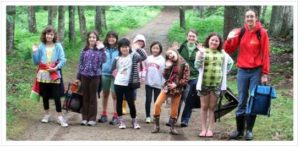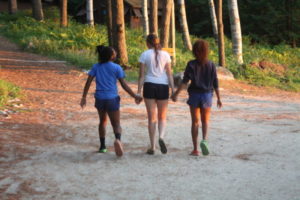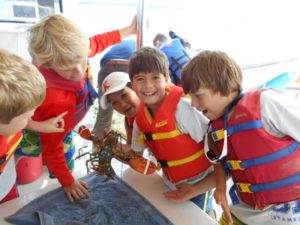Camp and Parents: Collaborating to Give Kids Successful Summers
Camps across Maine are beginning their summer sessions. Youngsters from Maine, the U.S., and all over the world are gathering for experiences both familiar and new. And supporting those youngsters are parents and camp personnel working together. Parents are in a unique position, camp directors say. They are entrusting their kids to camp staff, and both before and during camp, parents play a meaningful role in helping their kids have a summer of fun, growth, and empowerment.
At Alford Lake Camp, a girls’ camp in Hope, Certified Camp Director Sue McMullan says parents have a direct relationship with camp leadership. By reassuring parents that “we can’t wait to hear from them, they can call any time,” McMullan says parents feel less anxious about the camp experience.

Parents can empower their daughters
McMullan says parents can play a significant role in preparing their children for a positive camp experience. That role begins with being “excited and enthusiastic,” as well by validating their daughters’ feelings of nervousness about attending camp. By sending the messages such as “we know you can do this,” and “this is going to be so awesome for you,” parents can empower their daughters, McMullan says.
Letter writing is also key. Letters should be “more about ‘tell me about what you’re doing’” than about what the child is missing at home, she says. Parents can gauge how much to talk about home from the contents of the letter they get back.
McMullan says writing “a couple times a week,” can strike a good balance.
“If I see a parent writing a lot, and it’s interfering with adjustment, I’ll pick up the phone.” An actual conversation, rather than an email exchange, allows the camp to encourage the parent and “have them see their camper through our eyes,” she says.
In Raymond, at girls’ Camp Wawenock, director Catriona Sangster also says normalizing a child’s anxiety about coming to camp is an important parent role. Parents can “remind girls that they believe in them, believe in camp, and they know the girls are going to be supported in any way they need,” she says.
One way of helping their daughters manage nervousness about camp is “to talk about successes in the past,” Sangster says. “We encourage them to draw on those experiences.”
Sangster says she also speaks frequently to parents about normalizing the experience of missing home while at camp, “so girls don’t feel ashamed or try to hide that feeling.”

Avoid topics that might make a child miss home
And with respect to letter writing, targeted questions can be helpful. Inquiring about new friends, cabin mates, and questions about counselors can all result in a child’s focusing on her camp experience as she writes back. Letters from parents can share a little about what’s happening at home, Sangster says, but should avoid topics that might make a child miss home.
The camp-parent relationship integral to a camper’s positive experience is fostered well before camp begins, Sangster says. For example, Camp Wawenock sends a letter to first-time camp families outlining a broad range of ways parents can support their daughters attending camp. Among the suggestions are the following: reminding the child of how powerful and terrific she is; normalizing fears of missing home; encouraging the child to connect with a staff member to share feelings with; and having a letter waiting for her when she arrives at camp.
The letter also supports parents in talking to their daughters about living in a cabin with other girls, and encourages pre-camp conversations about getting to know fellow campers, sharing a counselor with others, being open, honest and respectful, and following camp policies intended to keep girls emotionally and physically safe.

The relationship between camp and home is a “true partnership”
Similarly, Garth Altenburg, director of Camp Chewonki for Boys in Wiscasset, says the relationship between camp and home is a “true partnership” that begins with gathering information from parents about their sons.
“Right from the start it lets them know that we are interested in the whole child,” Altenburg says. “I recognize the great trust that’s placed in us.”
“I hope that inspires confidence,” he says.
That partnership also serves to provide parents with guidance about how they can best support their sons while they are at Camp Chewonki, Altenburg says. For example, Camp Chewonki encourages parents to write “frequent but not an overwhelming amount of letters,” he says. About three letters weekly, which focus on the child’s camp experience rather than what he is missing at home, can reassure the camper that his parents are behind him in his camp experience.
In turn, letters from campers to home can help the camp-family partnership, Altenburg says. He says he asks parents to let him know if they receive information from their sons that would be useful to camp staff, such as concerns about the food or sleeping conditions.
“We want to know about it,” he says. But because counselors spend their days with campers, rather than responding to parent email, Altenburg says communication flows directly through him.
Camp is a time of excitement and anxiety for both parents and their children, and camp directors are poised to help families embrace all those feelings. By collaborating with parents and offering suggestions for supporting children headed off to camp, those directors are helping families prepare for kids’ camp experiences that are healthy, fun, and memorable.